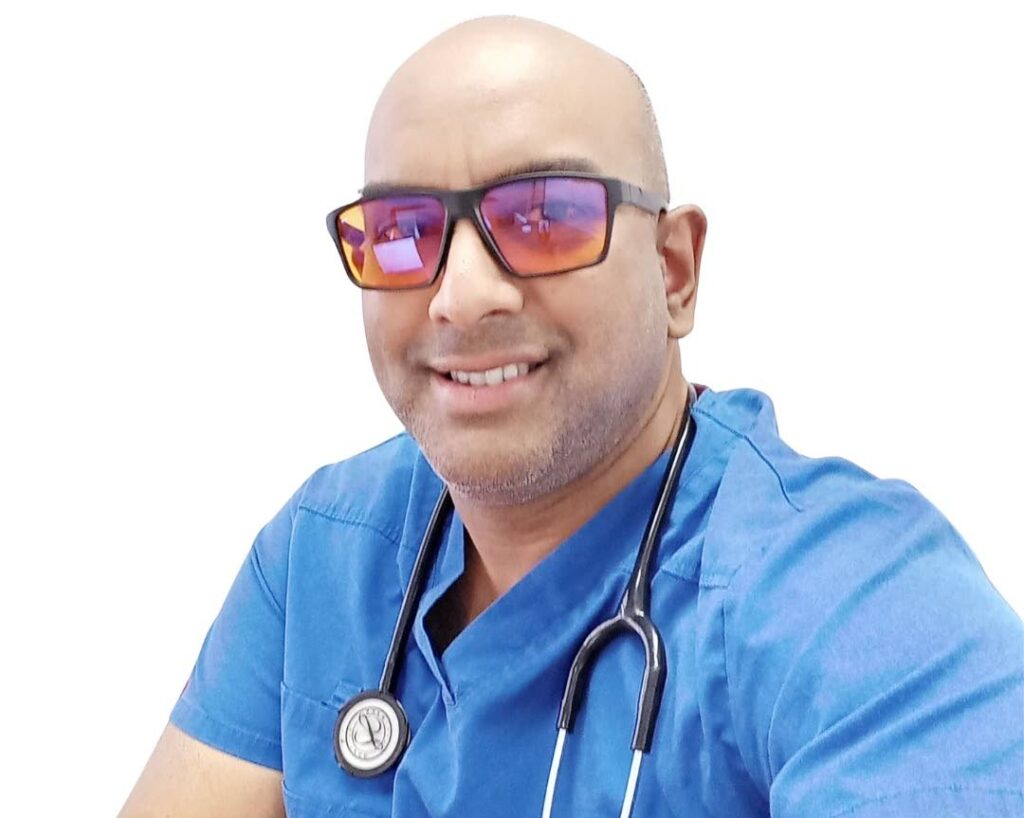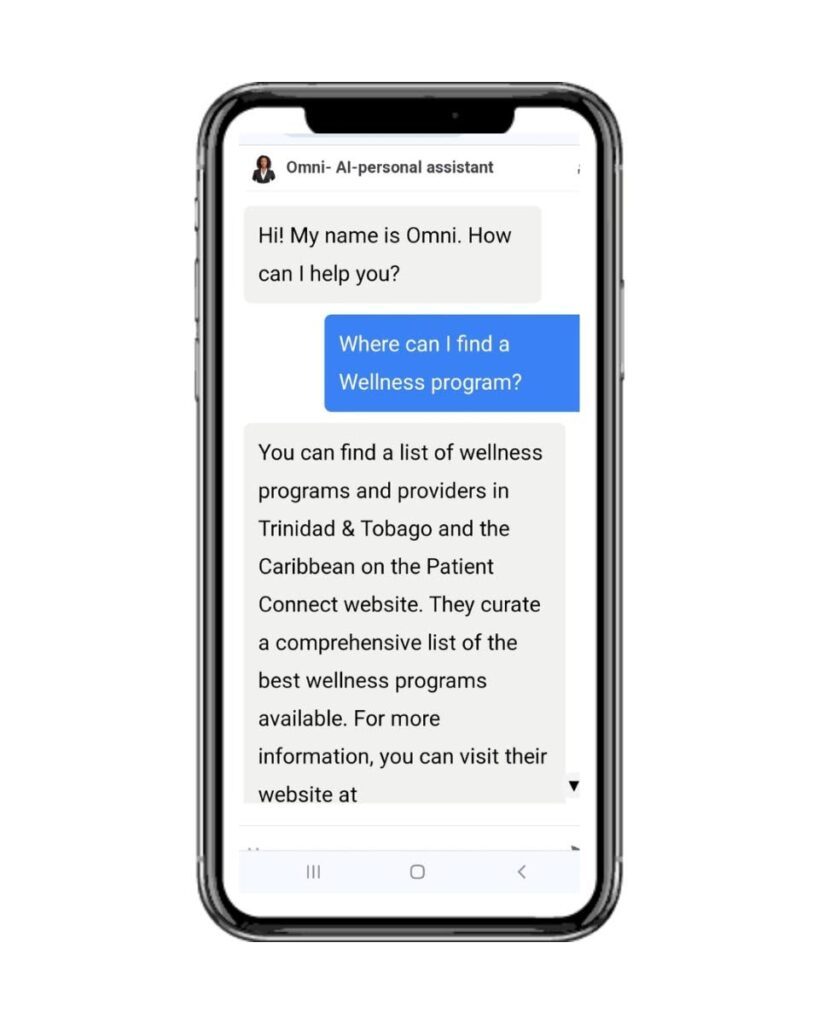Can Trinidad and Tobago be an AI health hub of the Caribbean?

BAVINA SOOKDEO
Artificial intelligence (AI) has become a transformative force in various industries, and healthcare is no exception.
In an interview with Business Day, Dr Navi Muradali, a dental surgeon and doctor, delved into his journey and the pivotal role AI plays in the medical landscape.
His interest in public health, having previously served as the Mayor of San Fernando, and the desire to merge medicine with technology led him to explore the potential of AI in healthcare.
He studied at Naparima College and Santa Fe Community College, Florida. Muradali's interest in public health led him to work in various facilities, including the Port of Spain and San Fernando general hospitals.
He also contributed as a tutor at the Eric Williams Medical Sciences Complex and trained young doctors at the Maxillo-Facial Unit in San Fernando General Hospital.
He recounts his early exposure to technology, saying, “My first computer was a Commodore 64, and I would spend hours trying to figure out coding. But without anyone to help me, I gave up on wanting to be a coder.”
It wasn't until the covid19 pandemic, with patients unable to visit the clinic, that he recognised the need for innovative solutions.
“I embarked on a mission to establish efficient remote communication. Initially exploring telehealth platforms (providing health related services and information via smartphone or computer)
the prohibitive costs of third-party development prompted me to create a solution.
"This gave rise to Virtual Wellness, a telehealth platform offering free health services, including mental health and dietary support, to those confined by lockdowns.
"Serving over 9,000 individuals, we prioritised customisation, white-labelling (a legal agreement between a manufacturer/provider and seller) and ease of use. The platform evolved to incorporate advanced features like remote patient monitoring, catering to specific needs such as diabetics, high-blood-pressure patients, and individuals with covid19 requiring home monitoring.”
Collaborating with local entities and NGOs, Muradali and his team played a role in health initiatives such as PAHO's vaccination awareness campaigns across the country.
“In 2021, we pioneered free online clinics in TT, endorsed by the Supermarkets Association and SEWA TT, attracting thousands of users, many experiencing telehealth for the first time. Impressively, our customer satisfaction score (CSAT) reached 85 per cent.
"However, recognising the missed potential of AI systems during this phase, we resolved to incorporate trained AI chatbots, a vision realised in 2023. Operating on a limited budget, Virtual Wellness relied on personal loans exceeding $350,000. This experience underscored the necessity for more affordable and accessible telehealth solutions for companies, leading to the inception of Patient Connect.”
Digital wellness: Patient Connect
In 2022, Patient Connect replaced Virtual Wellness as a low-cost digital health-services provider for business.
The idea was to offer telehealth services, including remote patient monitoring and AI solutions, to businesses, for their subscribers and employees.
Muradali explained, “Witnessing a surge in smartphone and internet adoption in TT, the Caribbean and Latin America, we anticipate a shrinking digital divide of people without access to the internet by 2030.
"Patient Connect aims to leverage this trend by offering digital health and wellness apps to reach more people than traditional in-person services can. Recognising the prevalence of lifestyle diseases in the Caribbean and Latin America, such as heart disease, diabetes and cancer, we strive to deploy prevention and educational wellness apps to make a significant impact.”

Post-covid, healthcare workers faced burnout, prompting a need for supplemental online health services to increase accessibility and decrease waiting times.
As Muradali explained, “Digital wellness apps play a crucial role in alleviating the burden on the healthcare system. Patient Connect’s introduction of remote patient monitoring (RPM) with AI integration, currently serving nearly 1,000 subscribers, allows real-time tracking of vital readings, enabling early interventions and better outcomes.”
In 2023, the Human Resource Management Association (HRMATT) partnered with Patient Connect to launch Wellness Hub, an AI-enhanced digital wellness service.
For over 600,000 Wellness Hub offers mental health counselling and health and fitness services,
“Omni, our AI-personal assistant, aids users in finding care providers, booking appointments and providing basic information. Furthermore, we’re expanding into the Latin American market with Omni's Spanish-speaking sister, Elena,” Muradali said.
Patient Connect has invested over $0.5 million in developing digital wellness apps. By March, operations will begin in Barbados, and discussions with Jamaican businesses are under way, with the aim of going into business by 2024.
Muradali said, “Prioritising mental health counselling in students, we are in talks with educational bodies to introduce an AI-assisted digital wellness app focusing on mental and sexual health education and resources for enthusiastic young users.”
AI healthcare costs
Muradali identified three key ways in which AI has contributed to reducing healthcare costs:
Accurate diagnoses: AI algorithms assist radiologists in identifying potential issues, leading to more precise diagnoses and reducing the need for unnecessary tests.
Preventive measures: By identifying at-risk populations early on, AI enables healthcare providers to implement preventive measures, reducing hospitalisations and emergency interventions.
Remote patient monitoring: AI-assisted monitoring allows patients to be monitored from home, minimising in-person visits and hospital stays.
Muradali said, “Before our AI assistant, we would have had to manually look for trends in blood glucose and blood-pressure values after patients had submitted them for monitoring. With AI, we have been able to set parameters so that the AI monitors high and low values seamlessly.
"This has cut the amount of time by more than 75 per cent that our human health team would take to check the values and contact the patient.
"This would undoubtedly lead to better control and a lesser likelihood of hospital admissions and re-admissions which would have sent healthcare costs higher for the patient and insurer or State.”
Additionally, Omni and Elena, AI-personal assistants, have significantly reduced the time spent searching for healthcare providers in the region by providing a well-curated listing.
“It also assists companies with their employee wellness programmes by identifying high-risk employees who could benefit from a much more tailored health intervention. Patient Connect’s AI tools will continue to monitor and track wellness data collected from the various wellness programmes and, with machine learning software, develop predictive modelling which can help bodies like the Ministry of Health and PAHO, as well as UWI and CARPHA, with advanced analytical data to support epidemiological profiling and health policy,” Muradali explained.
While implementing AI in healthcare can bring benefits, there are upfront costs.
“Most modern electronic health records (EHR) services that local hospitals use would have APIs (Application Programming Interface) that could support AI tools. So the cost would really be for the AI-API, which would decrease with time.
"The concern would be ensuring that such AI systems are...compliant so that patient health information (PHI) remains safe and secure. IT professionals employed by local hospitals and clinics can work with their various EHR providers to integrate AI into their databases to generate better reports for administrators.”
Given that public healthcare is free in TT, how do healthcare providers make the integration of AI financially sustainable and potentially profitable?

Muradali said, “The public healthcare system has not yet adopted modern electronic records or patient portals. Since AI would require those systems as a baseline to extract data, it could be many years before public systems can successfully use AI for health planning and policy."But, he added, "Currently, there are grants offered by the Inter American Development Bank (IDB) and assistance from the Ministry of Digital Transformation."
Muradali envisions a future where AI radically transforms the health sector. He predicts AI-assisted radiology screenings, personalised medicine, and virtual-reality applications for the elderly.
The future of AI in healthcare
Muradali said, “The future of healthcare will rely on human and AI-integrated systems.
"I have had to pivot in understanding what that integration looks like, taking into account ease of use, accessibility, cost and data protection.
"Patient Connect’s niche therefore is unique, in that there are currently no other companies offering digital wellness apps and services with AI integration in the way we do, at scale and efficiency. Being the first company to offer AI-assisted digital wellness apps will be our legacy as we continue to evolve as AI and technology evolves.
"We are exploring the augmented and virtual reality niche with the view of having a prototype before the end of 2024. Patient Connect would like to see an AI-assisted multi-functional digital wellness app on the smartphone of every resident in the Caribbean and Latin America by 2030.”
As for how Muradali sees AI making the country a more attractive destination for medical treatments and how it might play a role in positioning TT as a centre for medical excellence, Muradali pointed out, “Electronic or e-medical tourism is one of Patient Connect's goals, as we now have wellness hubs in TT and Barbados.
"With our push soon in Jamaica, Guyana and the Bahamas, we want to see a One Caribbean Health Hub, that offers e-medical tourism and traditional medical tourism services. By integrating AI into the apps that we build for residents to find the best providers and destinations, we think it is possible that people from outside the region would utilise these services.”
The issue in most Caribbean countries, Muradali explained, would be the ease of doing business and building a one-stop shop for these services, such as air travel, transport, accommodation and cost-effective medical procedures.
“There are already various-sized medical tourism hubs in the Caribbean, such as in the Cayman Islands, Barbados and even here in TT.
"However, integrating AI-assisted digital health services with on-the-ground services would require special planning and execution. If local hospitals and clinics could rapidly adopt cutting-edge AI diagnostic services such as AI-breast cancer detection and AI-personalised medicine treatments, the region could potentially attract patients from North America and Europe who also wish to escape from the high cost of healthcare, as well as the cold.”
Muradali added that Patient Connect would like to see regional governments make it easier to do business and offer ways to set up businesses entirely online.
“In our experience, the current paperwork and numerous documents required is a major turn-off. Regulations, paperwork, lack of innovation, poor public service, corruption and crime are deterrents to making TT a health hub for the Caribbean.”
Looking ahead, Muradali said the future is AI. It will radically transform the health sector within the next few years. AI-assisted radiology screening for conditions like breast and colon cancer, AI in sifting through terabytes of health data to guide better health policy using machine learning and AI in personalised medicine to effect better treatments are just the tip of the iceberg.
AI will also be used to provide better care for the elderly, such as with virtual-reality headsets that could provide support for loneliness and rehabilitation after surgery. The use of AI in mental health management would be revolutionary, as patients could access care much more easily and use AR/VR technology to get more immersive experiences while dealing with depression and anxiety.
Some of these technologies have already been deployed elsewhere, and Patient Connect will be working with its developers and partners to bring AI-assisted care to the region by the end of 2024.
Muradali added that AI would not replace healthcare professionals anytime soon, and it is not the intention to replace humans with machines; rather it's a question of how best to use AI and machines to support the very tedious and tiring work of healthcare professionals to prevent medical errors and burnout.


Comments
"Can Trinidad and Tobago be an AI health hub of the Caribbean?"